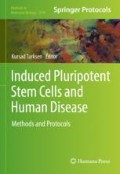Abstract
Cancer stem cells (CSCs) are capable of continuous proliferation and self-renewal and are proposed to play significant roles in oncogenesis, tumor growth, metastasis, and cancer recurrence. CSCs are considered derived from normal stem cells affected by the inflammatory microenvironment. Stem cells, are considered to be induced into progenitor cells, which differentiate into various normal phenotypes depending on the normal niche. We hypothesized that CSCs could be derived from stem cells in the cancer-inducing niche, which is a condition of chronic inflammation rich in growth factors, interleukins, chemokines, etc. Exosomes are considered to be the key mediators responsible for the cell-to-cell communications carrying proteins, nucleic acids, metabolites, etc., to shuttle between cells. If these cells are in the environment of chronic inflammation, the exosomes should be reflecting the conditions. In this chapter, we detail the method of CSC initiation using extracellular vesicles (EVs) derived from cancer cell. The stem cells treated with the EVs acquired characteristics of CSCs showing spheroids expressing stemness markers in the suspension culture and high tumorigenicity in Balb/c nude mice. EVs might perform as suitable inducer for initiating CSCs from stem cells or progenitor cells. The model of CSCs and the procedure of their establishment with EVs will help study the exact effect of EVs in the cancer-inducing niche and tumor microenvironment.
Access this chapter
Tax calculation will be finalised at checkout
Purchases are for personal use only
References
Doyle LM, Wang MZ (2019) Overview of extracellular vesicles, their origin, composition, purpose, and methods for exosome isolation and analysis. Cell 8(7):727. https://doi.org/10.3390/cells8070727
Liu Y, Shen Q, Zhang L, Xiang W (2020) Extracellular vesicles: recent developments in aging and reproductive diseases. Front Cell Dev Biol 8:577084. https://doi.org/10.3389/fcell.2020.577084
Thery C (2011) Exosomes: secreted vesicles and intercellular communications. F1000 Biol Rep 3:15. https://doi.org/10.3410/B3-15
Zhang Y, Liu Y, Liu H, Tang WH (2019) Exosomes: biogenesis, biologic function and clinical potential. Cell Biosci 9:19. https://doi.org/10.1186/s13578-019-0282-2
Azmi AS, Bao B, Sarkar FH (2013) Exosomes in cancer development, metastasis, and drug resistance: a comprehensive review. Cancer Metastasis Rev 32(3–4):623–642. https://doi.org/10.1007/s10555-013-9441-9
Kim H, Kim DW, Cho JY (2019) Exploring the key communicator role of exosomes in cancer microenvironment through proteomics. Proteome Sci 17:5. https://doi.org/10.1186/s12953-019-0154-z
Thompson PA, Khatami M, Baglole CJ, Sun J, Harris SA, Moon EY, Bisson WH (2015) Environmental immune disruptors, inflammation and cancer risk. Carcinogenesis 36(Suppl 1):S232–S253. https://doi.org/10.1093/carcin/bgv038
Xu J, Liao K, Zhou W (2018) Exosomes regulate the transformation of cancer cells in cancer stem cell homeostasis. Stem Cells Int 2018:4837370. https://doi.org/10.1155/2018/4837370
Afify SM, Seno M (2019) Conversion of stem cells to cancer stem cells: undercurrent of cancer initiation. Cancers 11(3):345. https://doi.org/10.3390/cancers11030345
Chen L, Kasai T, Li Y, Sugii Y, Jin G, Okada M, Vaidyanath A, Mizutani A, Satoh A, Kudoh T et al (2012) A model of cancer stem cells derived from mouse induced pluripotent stem cells. PLoS One 7:e33544. https://doi.org/10.1371/journal.pone.0033544
Yan, T., Mizutani, A., Chen, L., Takaki, M., Hiramoto, Y., Matsuda, S., . Seno, M. (2014). Characterization of cancer stem-like cells derived from mouse induced pluripotent stem cells transformed by tumor-derived extracellular vesicles. J Cancer, 5(7), 572-584. doi:https://doi.org/10.7150/jca.8865
Calle AS, Nair N, Oo AK, Prieto-Vila M, Koga M, Khayrani AC, Hussein M, Hurley L, Vaidyanath A, Seno A et al (2016) A new PDAC mouse model originated from iPSCs-converted pancreatic cancer stem cells (CSCcm) am. J Cancer Res 6:2799–2815
Nair N, Calle AS, Zahra MH, Prieto-Vila M, Oo AKK, Hurley L, Vaidyanath A, Seno A, Masuda J, Iwasaki Y et al (2017) A cancer stem cell model as the point of origin of cancer-associated fibroblasts in tumor microenvironment. Sci Rep 7:6838
Afify SM, Chen L, Yan T, Calle AS, Nair N, Murakami C, Zahra MH, Okada N, Iwasaki Y, Seno A, Seno M (2019) Method to convert stem cells into cancer stem cells. Methods Protoc 2(3):71. https://doi.org/10.3390/mps2030071
Afify SM, Sanchez Calle A, Hassan G, Kumon K, Nawara HM, Zahra MH, Seno M (2020) A novel model of liver cancer stem cells developed from induced pluripotent stem cells. Br J Cancer 122(9):1378–1390. https://doi.org/10.1038/s41416-020-0792-z
Author information
Authors and Affiliations
Corresponding author
Editor information
Editors and Affiliations
Rights and permissions
Copyright information
© 2021 Springer Science+Business Media, LLC
About this protocol
Cite this protocol
Afify, S.M., Hassan, G., Yan, T., Seno, A., Seno, M. (2021). Cancer Stem Cell Initiation by Tumor-Derived Extracellular Vesicles. In: Turksen, K. (eds) Induced Pluripotent Stem Cells and Human Disease. Methods in Molecular Biology, vol 2549. Humana, New York, NY. https://doi.org/10.1007/7651_2021_371
Download citation
DOI: https://doi.org/10.1007/7651_2021_371
Published:
Publisher Name: Humana, New York, NY
Print ISBN: 978-1-0716-2584-2
Online ISBN: 978-1-0716-2585-9
eBook Packages: Springer Protocols

